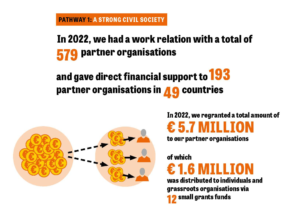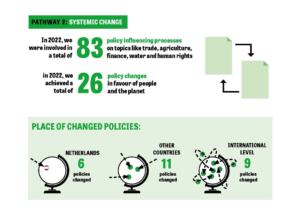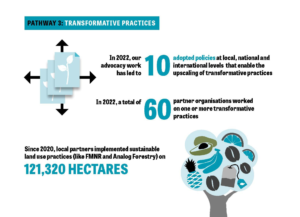Our achievements in 2022
To achieve our vision of a sustainable, fair and inclusive world, Both ENDS works to empower civil society, to change the system so it prioritises people and the planet, and to support transformative practices. The numbers and successes below together show the broad variety of our achievements along each one of the three pathways.
STRONG CIVIL SOCIETY
Both ENDS cooperates with many partner organisations around the world to strengthen civil society, advocate for green and fair policies and support transformative practices. This cooperation entails much more then only financial support; we strategise together and each take our own role in our joint efforts for just and sustainable societies. Our partner network embraces the whole world:
SYSTEMIC CHANGE
In order for systems to prioritise people and the planet, Both ENDS and partners aim to change the system step by step, policy by policy. Where policies are already strong, they need to be implemented, and where they are absent, we advocate for new ones to be enacted, on all levels. Influencing policies often is a matter of patience. It might take years until change finally materialises. This is why Both ENDS and partners are involved in such a large number of policy influencing processes:
TRANSFORMATIVE PRACTICES
According to Both ENDS and partners, transformative practices are the future. There are many of these bottom-up, planet-friendly practices. By strengthening and eventually up-scaling transformative practices, Both ENDS and counterparts show tangible examples that can inspire and promote a radically different system that places human and environmental well-being at its core:
SOME EXAMPLES OF OUR IMPACT IN 2022
STRONG CIVIL SOCIETY
- Uganda is one of many countries where the situation for environmental organisations has deteriorated. Both ENDS has taken steps to develop a more systematic and proactive approach to supporting partners in addressing safety and security issues. In 2022, we successfully mobilised resources to support six Ugandan organisations to strengthen collaboration, increase their visibility, and carry out joint advocacy towards a green and sustainable future.
- At the Climate conference (COP27) in Egypt, Both ENDS was able to do what we stand for: connecting people for change. By bringing partners together, and by facilitating exchanges between our partners and policymakers, we achieved to give our partners a podium on which to make their voices heard.
- As a response to the demands of our partner Forum Suape in Brazil, the license for Dutch dredging company Van Oord in Port Suape was limited to the winter period. This will drastically lower the impact of the dredging works on the livelihoods of the local community. This decision came after another breakthrough in Suape, when a controversial dam in the Rio Tatuoca that was destroying the mangroves and the aquatic life in the area was partially dismantled, enabling the ecosystem to slowly recuperate. Together with Fórum Suape, Both ENDS has been working for almost ten years to protect the rights of local communities in and around Suape.
- In 2022, Both ENDS and the Land Portal Foundation started a series of webinars, called “Whose Land? Inclusive Pathways to Land Governance”. The four-part webinar series provided a platform for different stakeholders engaged in land governance to exchange on the importance of inclusivity and meaningful participation of all relevant actors in both formal and informal land governance processes. In total 1614 people participated in the webinars.
SYSTEMIC CHANGE
- In Mozambique, few women can rest assured that their right to use and enjoy land is guaranteed. Forum Mulher, a network of Mozambican women’s rights organisations, raised public awareness and mobilised rural women to effectively make their voices heard during the government’s formal review of the legislative framework for land governance.
- The Netherlands finally decided to withdraw from the Energy Charter Treaty (ECT). This is good news for the energy transition in the Netherlands and beyond. Both ENDS has been working with partners for a number of years to raise awareness about the disadvantages of the ECT, especially in countries in the Global South that were considering joining the treaty, such as Uganda and Indonesia.
- In Argentina, after intensive advocacy by our partner FARN, the government adapted its national biodiversity policy to be in line with the international CBD-framework, including norms concerning human rights, gender and the recognition of biocultural corridors – an important pillar of the Wetlands without Borders programme.
- As part of a European tour and together with Brazilian partners (Instituto Cordilheira) Both ENDS pre-screened ‘Illusion of Abundance‘, a documentary sharing the story of three Latin American women fighting injustice caused by large scale development projects. The panel debate after the screening and several follow-up screenings requested by Dutch investors, generated an in-dept discussion about the role of investors on due diligence, prevention and improvement of communication with communities in potentially affected areas.
- The Inter-American Development Bank (IDB) has taken a unique decision to withdraw from the construction of two controversial dams in Ixquisis, Guatemala. Both ENDS has supported our partner AIDA for many years in its fight against the dams.
TRANSFORMATIVE PRACTICES
- As part of the Global Alliance for Green and Gender Action (GAGGA), the International Analog Forestry Network (IAFN), a long-term partner of Both ENDS, is inspiring and supporting women’s leadership in their communities to restore local ecosystems using natural forests as a model. They succesfully built a network of local Analog Forestry Promoters during the pandemic years.
- At the UNCCD COP15 in Abidjan, the UNCCD adopted the FAO’s “Technical Guide on the implementation of the VGGTs in Land Degradation Neutrality”, including suggestions by Both ENDS and partners. This technical guide builds on the groundbreaking COP14 decision on Land tenure. With this technical guide, the UNCCD offers a tool to support countries to integrate the tenure guidelines in their land use policies and to halt desertification and land degradation and mitigate the effects of drought. Both ENDS and partners – especially from the Drynet Network – have since long advocated for this matter.
- In the Wetlands without Borders programme, our partner CODES has created ‘Family Seed Banks’ in Paraguay for the preservation and multiplication of native and endangered seeds. So far 5 seed banks have been created and these families were named as “Guardians of Seeds”. They harvest, store and share these native seeds in the community. Community-managed seed banks are an important aspect of agroecology and contribute to local food sovereignty.
- Our partner organisation Prakriti Resource Centre (PRC) supported 28 local women’s groups in Nepal to undertake and promote environmental and climate actions. These actions include organic farming, forest plantation and pruning, water management and waste recycling. The women’s groups also influenced their newly elected local governments to scale up climate actions and in some cases managed to access municipal budgets to further implement their gender just climate actions.
- Our “Communities regreen the Sahel” programme, aimed at supporting partners for at least ten years (2018-2028), is now halfway. Together with more than 20 local partner organisations and more than 40.000 farmers in Senegal, Burkina Faso and Niger, we’ve regreened already a 100.000 hectares of farmland in 5 years time.



